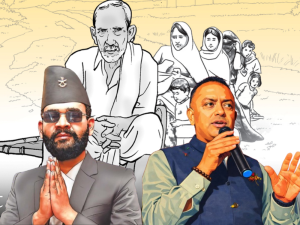Columns
Public scrutiny of emotions
The flawed notion of a woman weaponising her tears precludes any appreciation of her as a human.
Avasna Pandey
Last week, Ram Kumari Jhakri's tears during a farewell programme brought a hullabaloo in Nepal's social-political sphere as if Nepali society had not seen a woman cry before. While many described her tears as her reluctance to let go of her position of power and privilege, others tried to find in her tears the tell-tale signs of weakness that a patriarchal society often describes as an inherent trait of a woman. But the fact of the matter is that humans are full of emotions and it is perfectly fine for a woman to cry in public, no matter whether she is a commoner or an outgoing minister of urban development.
It's not that the youth leader cried through the farewell. “Can you ask me some annoying questions? Only then can I speak up," Jhakri said even as she wiped her tears and smiled at the same time. It was as if she was personifying a sunshower—a meteorological phenomenon where the sun shines while it's still raining. Such duality even makes way for a rainbow at times—a multicoloured arc that lights up the sky gracefully. It is not at all bad to be and feel many things at the same time. After all, there is an enduring dichotomy in all human beings.
Underlying sentiments
There might have been many underlying sentiments that I will not claim to know, but it looked like the ceremony had overwhelmed her. When asked why she was so bhavuk, Jhakri suggested that she be asked annoying questions assuming they would help distract her from the act of crying. We have seen Barack Obama do so many times during his tenure as president of the United States, and he has hardly been considered a "weak" or bhavuk president. But Jhakri’s teary moment was treated with cynicism by a large section of the public. For someone who otherwise had the reputation of being a loud, fierce leader, it must have taken great strength to be so vulnerable publicly. Jhakri was evidently incapacitated by the party’s decision to recall its ministers, but to reduce her feelings to acts of political spectacle or her reluctance to leave a position of power seems unjustified.
The hyper-insensitive reaction to Jhakri makes us believe that public crying—an act seen as losing control, and inability to be rational—is a grave political error. Thousands of comments on social media point to the fact that the public will make Jhakri feel unremitting social guilt. In fact, she has already apologised on social media saying she couldn't control herself at that time. But expressing feelings makes for a meaningful element of human lived experience and a big part of politics too.
For the longest time, patriarchy has considered hysteria a major emotional trait of women. People find all kinds of reasons to discredit a woman’s reputation based on a flawed notion of hysteria. A woman’s tears are considered her weakness or a weapon for emotional blackmail while her action remains in the shadows. This flawed notion of a woman weaponising her tears precludes any appreciation as a human.
Humans go through highs and lows; it's a continuum. Showing emotion is part of who we are as thinking, emotional human beings. We can think and feel at the same time, without the two being dichotomous. And different parts of us become dominant at different times. The two fundamental forces of human nature include order and chaos—Apollonian and Dionysian, as Friedrich Nietzsche would say. The two Greek gods have their individual characters. Apollo is the god of the sun, truth, light and logic, while Dionysus is the god of merrymaking, emotions and impulses. And the two remain within us.
A single incident of emotional outburst cannot be considered the epitome of an individual's character. Emotions inherently guide our behaviour and the decisions we take. If emotions have been omnipresent in our way of being, then why should anyone, least of all a politician, be criticised for expressing them? Instead, the parameters of how we judge our leaders should change. Our discontent with leaders rightly stems from their inactions and excessive greed to stay in power or to continue being politically relevant. But instead of wanting to know what work a leader might have done during her tenure as a minister, our gaze was fixated on Jhakri’s tears.
We are often inclined toward a certain political belief and we feel those beliefs are important to our identity. It helps construct our sense of who we are and whenever that line of thought is challenged, we spring to defend. For example, this is the same reason why we vote or protest in the streets should we feel our territory is being encroached upon.
Although we might have adopted many legal provisions to increase the participation of women in political office, the truth remains that we are far away from the ideal state. The few women who rise to top positions must have been relentless in their pursuit. Given that, hurling comments at them solely based on gendered notions of masculinity and femininity and the socially constructed traits which define them is problematic on our end. It reflects the audience’s prematureness rather than that of the political leader being roasted.
Modern idea
The very idea of hiding our emotions in public is pretty much related to a modern idea of quantifying a human being's worth. Rationality was prioritised over other things which gave way to anything defying logic to be useless and unworthy of our time. Emotions didn't have a place here for the idea was that it would hamper productivity; and it is this worldview which was dominant in the 17th and 18th centuries that we still carry forward with us, shaping perceptions of right and wrong and what is acceptable in public and private life.
Instead, we must view people in their entirety to make humans out of them. Their assessment must come with our openness to their weaknesses and strengths and the two can mean different things to different people. Applying a teleological approach to humans and why they behave the way they do gives us incomplete answers to any curiosity we might have. And this applies to political individuals too who, at the end of the day, are as human as we are. In fact, their ability to express feelings and stir passions must be welcomed, rather than criticised and mocked. If we are nature’s creation, shouldn't we feel inspired by it and learn to be different things at once?




 12.53°C Kathmandu
12.53°C Kathmandu



.jpg&w=200&height=120)











